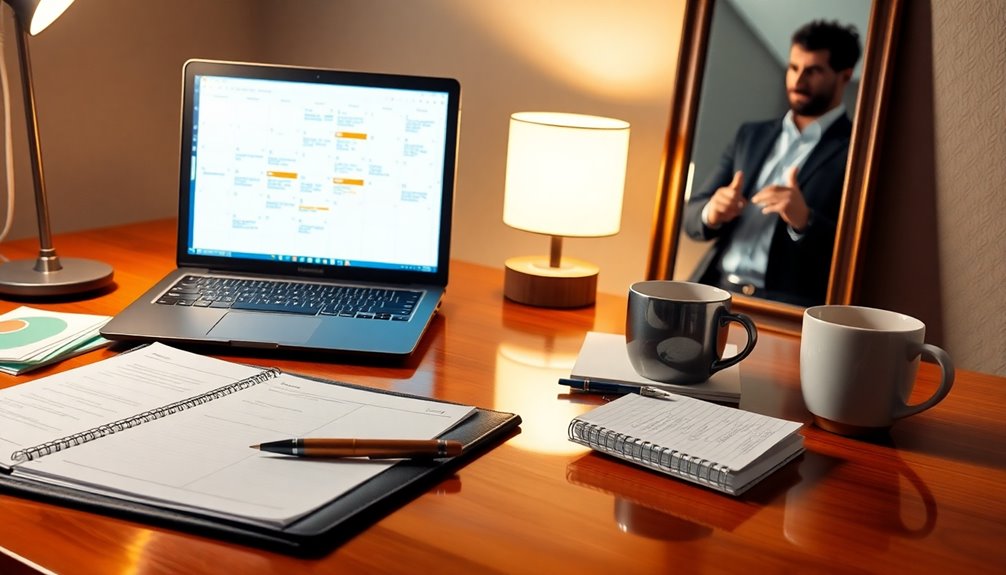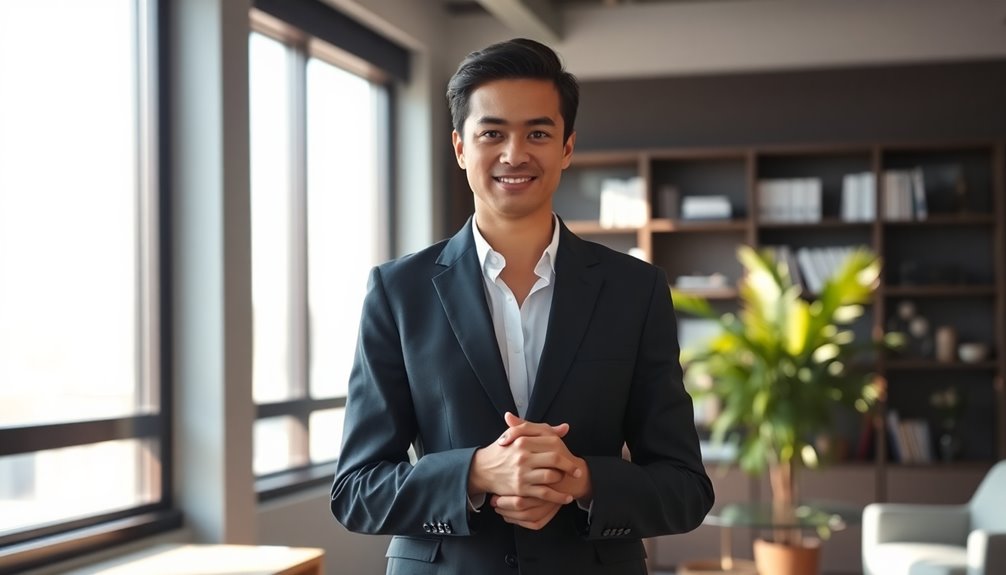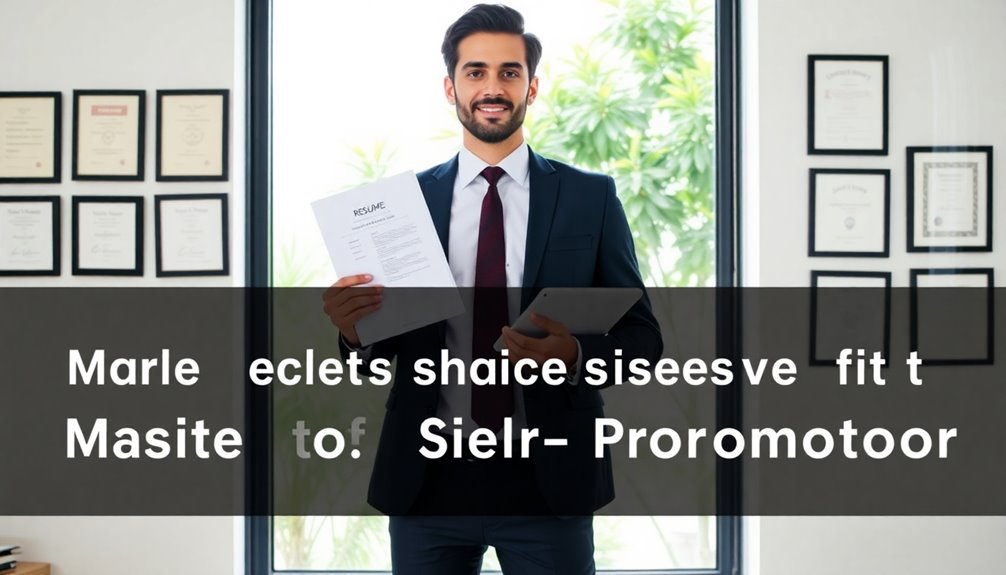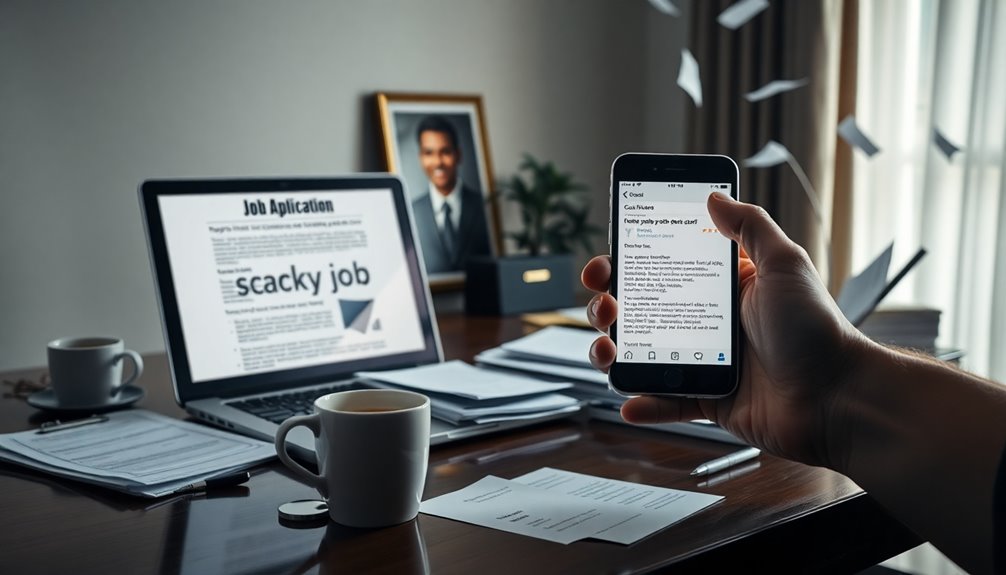To master the art of interview self-promotion, you need to effectively showcase your skills and personality. Start by highlighting your qualifications and unique strengths that align with the company's needs. Share personal anecdotes to humanize your experience, and don't shy away from discussing your interests and hobbies to create connections. Prepare a strong introduction and practice your key points to present confidently. Use positive body language and maintain eye contact to show engagement. By embracing authenticity and clarity in your communication, you'll make a lasting impression. There's so much more to explore to elevate your interview game.
Key Takeaways
- Highlight your unique strengths and qualifications that align with the job requirements to stand out from other candidates.
- Prepare anecdotes that showcase your professional experiences and how they relate to the company's needs and culture.
- Practice your self-promotion techniques, including a strong introduction and key talking points, to build confidence.
- Utilize effective communication skills, such as active listening and clear messaging, to engage the interviewer and convey your value.
- Foster personal connections by sharing relatable hobbies and expressing genuine interest in the company's culture to enhance your memorability.
Importance of Self-Promotion

Self-promotion is essential in today's competitive job market. When you sell yourself effectively, you demonstrate your potential value as an asset to the company.
Highlighting your qualifications, such as language proficiency or relevant certifications, sets you apart from other candidates and creates a memorable impression. It's not just about skills; sharing your personality and professional background gives insight into who you're and what you believe.
Emphasizing your unique strengths can be key reasons why you're the ideal candidate for the role. By preparing to discuss your achievements confidently, you can show how your experiences align with the company's needs, making a compelling case for why they should choose you over others.
Humanizing Your Interview

Creating a personal connection during an interview can greatly enhance your chances of leaving a lasting impression. Share your hobbies and interests to foster relatability. Use professional anecdotes that highlight your skills and experiences. Here's a quick guide to humanizing your interview:
| Connect | Engage | Differentiate |
|---|---|---|
| Share a personal story | Ask about company culture | Highlight unique traits |
| Mention a hobby | Discuss team experiences | Showcase problem-solving |
| Relate to the role | Express genuine interest | Show your personality |
Additionally, demonstrating your ability to maintain a positive relationship with others can reflect your skills in conflict management.
Preparation Techniques

When preparing for an interview, it's essential to focus on your strengths and how they align with the company's needs.
Start by researching the job description, understanding the company culture, and tailoring your responses accordingly.
To effectively showcase your qualifications, consider the following techniques:
- Get Comfortable Talking About Yourself: Practice discussing achievements and metrics.
- Plan Talking Points: Write down key qualifications and create an elevator pitch.
- Craft a Strong Introduction: Develop a narrative encapsulating your background and achievements.
- Relate to Company Needs: Highlight experiences that directly connect to the employer's expectations.
Presenting Yourself Confidently

Confidence plays an essential role in how you present yourself during an interview. When you walk into the room, stand tall and make eye contact to show you're engaged.
Prepare ahead of time by practicing your introduction and key talking points. This not only helps you feel more at ease but also projects assurance to your interviewer.
Use positive body language—smile, nod, and avoid crossing your arms. Remember, your tone matters; speak clearly and with enthusiasm about your experiences.
Embrace your unique traits and accomplishments without exaggeration. Authenticity builds trust, so let your personality shine through.
Effective Communication Skills

Effective communication skills are essential in conveying your qualifications and personality during an interview. They not only showcase your abilities but also help you connect with the interviewer.
To enhance your communication, focus on the following:
- Practice Nonverbal Cues: Maintain eye contact and use open body language.
- Listen Actively: Show engagement by nodding and responding appropriately.
- Be Clear and Concise: Avoid jargon and get straight to the point.
- Tailor Your Message: Relate your skills to the company's needs and culture.
Authenticity in Self-Promotion

Authenticity plays an essential role in self-promotion during job interviews. When you present your genuine self, you build trust with the interviewer, making a lasting impression. Instead of exaggerating achievements, focus on sharing accurate stories that highlight your skills and experiences.
Embrace humility and let your true personality shine; this approach fosters rapport and creates a more relatable atmosphere. Prepare anecdotes that showcase your problem-solving abilities and teamwork, emphasizing unique traits that set you apart.
Tailoring your responses to align with the company's values reinforces your authenticity. Remember, being real not only differentiates you from other candidates but also signals your commitment to the role. Incorporating self-care practices into your routine can enhance your confidence and overall well-being during the interview process.
Ultimately, authenticity speaks louder than rehearsed lines, making you a memorable candidate.
Post-Interview Follow-Up

A thoughtful post-interview follow-up can greatly impact your chances of landing the job. Sending a thank-you note shows your appreciation and reinforces your interest.
Make sure to include:
- A brief thank you for the opportunity to interview.
- A recap of key discussion points that resonate with you.
- A reminder of your qualifications and how they align with the role.
- An expression of enthusiasm for the next steps in the hiring process.
This simple gesture not only keeps you top-of-mind but also demonstrates your professionalism.
Continuous Personal Development

Following up after an interview is just one step in your journey to securing a job. Continuous personal development is essential for staying relevant and competitive in today's job market.
You should regularly seek opportunities to learn new skills, whether through online courses, workshops, or industry events. Engaging in self-reflection can help you identify areas for improvement and growth.
Networking with professionals in your field allows you to gain insights and share knowledge. Additionally, staying informed about industry trends and advancements will position you as a knowledgeable candidate. Embracing concepts like emotional alignment can also enhance your interpersonal skills, making you a more appealing candidate in interviews.
Frequently Asked Questions
How Do I Handle Difficult Interview Questions?
When you encounter difficult interview questions, stay calm and take a moment to think. It's okay to ask for clarification if needed.
Use the STAR method to structure your answers, focusing on specific situations and your actions. Be honest and authentic in your responses, showcasing your problem-solving skills and adaptability.
What Should I Wear to the Interview?
Your outfit can make or break your interview—it's like a superhero cape that either elevates or diminishes your presence.
Aim for professional attire that matches the company's culture. A tailored suit or smart dress showcases your seriousness, while subtle accessories add personality.
Remember, fit and comfort matter, too; you want to feel confident, not constrained.
Always err on the side of being slightly overdressed, as it reflects your respect for the opportunity.
How Long Should My Answers Be?
When it comes to answering questions in an interview, aim for concise responses that last about one to two minutes.
This length allows you to provide enough detail without overwhelming the interviewer. Focus on key points while showcasing your qualifications and experiences.
Practice structuring your answers to stay clear and focused, ensuring you address the question directly.
Can I Bring Notes to the Interview?
Yes, you can bring notes to the interview! It's a great way to stay organized and guarantee you cover important points.
Just make sure they're concise and relevant, so you don't appear overly reliant on them. Use your notes to jog your memory or refer to specific achievements, but aim to engage with the interviewer naturally.
Practicing beforehand can help you balance using notes while maintaining a conversational flow during the interview.
What if I Don't Have Relevant Experience?
Picture standing at the edge of a vast landscape, unsure of your path. If you don't have relevant experience, focus on your transferable skills.
Highlight your adaptability, problem-solving, and teamwork abilities. Share personal projects or volunteer work that showcase your strengths.
Use stories to illustrate your potential, and connect your unique traits to the company's values.
Conclusion
In today's job market, mastering self-promotion isn't just important—it's your golden ticket to success. By humanizing your interview, preparing thoroughly, and communicating confidently, you'll stand out like a beacon in a foggy sea of candidates. Embrace authenticity, and don't forget to follow up after the interview; it's your chance to leave a lasting impression. Remember, each interview is a stepping stone in your journey to greatness, so seize the opportunity and shine brightly!









